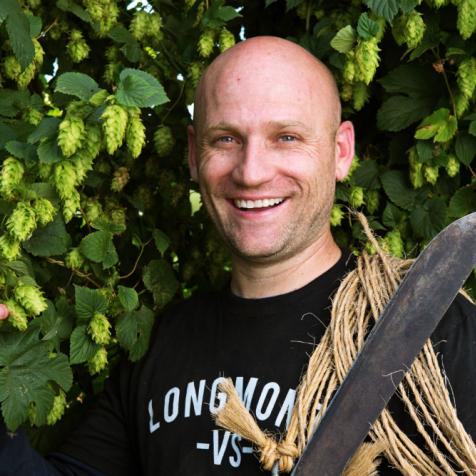
Company Details
Co-owners Scott Ziebell and John Rademacher are planning to grow more hops for Colorado's craft breweries.
When Rademacher and Ziebell embarked on a lifelong friendship back in preschool, they never imagined they'd someday become hop producers. They actually started their farm -- named by combining the first syllable of each of their last names -- as a hobby without any real goal in mind but to have some fun together.

"I had started growing hops in my backyard for my brother who is a homebrewer, but I'm not known to be a grower or farmer," recalls Ziebell. "John is a fourth-generation farmer, so we sectioned off a plot of land on his family's farm, purchased a bunch of rhizomes from a local farm in Niwot, and planted them there."
Because hops take three years to reach their full yield, Ziebell and Rademacher are only two years into full production on their half-acre plot. They estimate this year's harvest as roughly 400 total pounds wet or 100 pounds dried. "We had five varieties," Ziebell continues. "They were Chinook, Cascade, Crystal, Fuggle, and Neomexicanus."

Their harvest in August took about six hours and only a few people thanks to the use of Colorado Hop Company's mobile harvester. The pair co-own the year-old hop pelletizing company with Rademacher's father, Doug.
"We used to do a lot of hop-picking parties," Ziebell says. "A standard joke in the industry is that you have to find 30 to 40 new friends every year because it's a 10- to 12-hour day. Using harvesting equipment makes a big difference. You can pick your hops when they are ready instead of just when you have enough people to help you, and you end up with a better-quality hop as a result."
Another time-saver for RadZie is a unique trellis system designed by Rademacher. "Typically, when you harvest, you have to climb up to the top of the vine and cut it off," Ziebell explains. "That requires scaffolding, ladders, and other equipment. But John actually made a pulley system that allows us to lower the vines down so we can cut them that way."

"It's really just a winch on a cable that enables us to lower it down," Rademacher adds. "But so far, it has saved us a lot of time, blood, sweat, and tears."
Though RadZie sold a small percentage of its wet hops directly to brewers, the rest went to Colorado Hop Company for drying before being pelletized with the hops of seven other small Colorado farms as part of the company's new co-op. Specific varieties of hops from each farm -- including Cascade, Chinook, and Brewers Gold -- were combined to create larger quantities for the company's brewery customers.
"Some of the farms that Colorado Hop Company does the harvesting for only produce 40 pounds total," Ziebell says. "They might have an amazing hop, but a brewery can only do maybe one or two brews with it. We created the co-op to encourage farms along the Front Range to expand and grow their hop production as well as offer a consistent product. This way, we have thousands of pounds of a single variety rather than, say, small batches of seven different styles of Cascade."

Challenges: Ziebell says that anticipating future market demand is a big challenge for any hop farm. "As beer popularity changes, hop farms can't instantly adjust. You can't just throw a hop into the ground and expect to have a large yield the next year. That takes planning, timing, and investment. You have to make sure you are growing a hop that grows well here in Colorado but is also relevant for popular beer styles."
Opportunities: Rademacher and Ziebell are currently experimenting with some native hop varieties. "We want to make sure that we're growing hops that are unique," Ziebell explains. "It's going to be a lot of fun for us to see how those produce on a commercial scale rather than just a wild scale."
They are also planning an expansion. "Right now, we're looking at purchasing about a 65-acre farm just outside of Mead," Rademacher adds. "Hopefully we'll be able to start our expansion there next spring."

Needs: Because Colorado Hop Company's harvester is designed for plots of an acre or less, the pair will need to invest in new equipment as their hop farm expands. They'll also need to bring on more labor -- which Rademacher says is currently in short supply. "We're seeing a shortage all across agriculture," he concludes. "It's one of the biggest sticking points on my family's farm and farms in general. A lot of people don't want to do that kind of work when they find out how physically intense it is."

